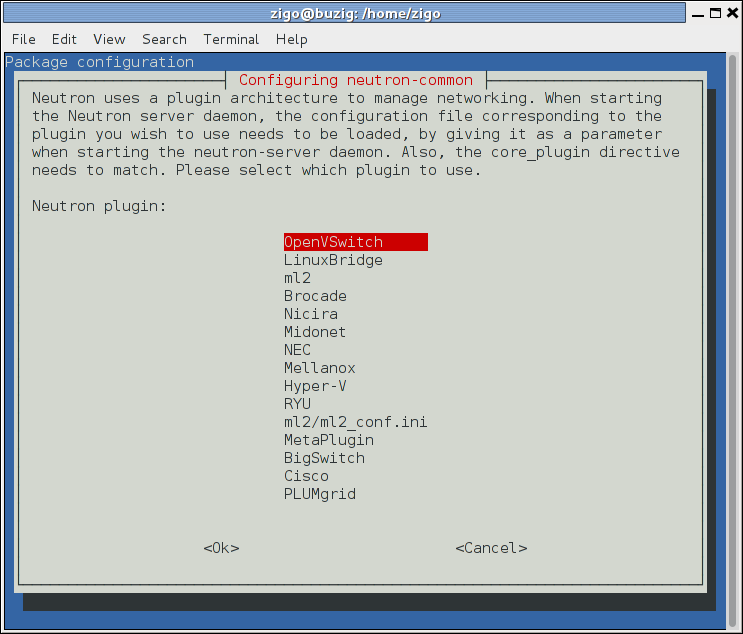Networking Option 1: Provider networks¶
Install and configure the Networking components on the controller node.
Install the components¶
# apt-get install neutron-server neutron-linuxbridge-agent \
neutron-dhcp-agent neutron-metadata-agent python-neutronclient
Respond to prompts for database management, Identity service credentials, service endpoint registration, and message queue credentials.
Select the ML2 plug-in:

Note
Selecting the ML2 plug-in also populates the core_plugin option
in the /etc/neutron/neutron.conf file with the appropriate values
(in this case, it is set to the value ml2).
Configure the server component¶
Edit the
/etc/neutron/neutron.conffile and complete the following actions:In the
[DEFAULT]section, disable additional plug-ins:[DEFAULT] ... service_plugins =
In the
[DEFAULT]and[nova]sections, configure Networking to notify Compute of network topology changes:[DEFAULT] ... notify_nova_on_port_status_changes = True notify_nova_on_port_data_changes = True [nova] ... auth_url = http://controller:35357 auth_type = password project_domain_name = Default user_domain_name = Default region_name = RegionOne project_name = service username = nova password = NOVA_PASS
Replace
NOVA_PASSwith the password you chose for thenovauser in the Identity service.
Configure the Modular Layer 2 (ML2) plug-in¶
The ML2 plug-in uses the Linux bridge mechanism to build layer-2 (bridging and switching) virtual networking infrastructure for instances.
Edit the
/etc/neutron/plugins/ml2/ml2_conf.inifile and complete the following actions:In the
[ml2]section, enable flat and VLAN networks:[ml2] ... type_drivers = flat,vlan
In the
[ml2]section, disable self-service networks:[ml2] ... tenant_network_types =
In the
[ml2]section, enable the Linux bridge mechanism:[ml2] ... mechanism_drivers = linuxbridge
Warning
After you configure the ML2 plug-in, removing values in the
type_driversoption can lead to database inconsistency.In the
[ml2]section, enable the port security extension driver:[ml2] ... extension_drivers = port_security
In the
[ml2_type_flat]section, configure the provider virtual network as a flat network:[ml2_type_flat] ... flat_networks = provider
In the
[securitygroup]section, enable ipset to increase efficiency of security group rules:[securitygroup] ... enable_ipset = True
Configure the Linux bridge agent¶
The Linux bridge agent builds layer-2 (bridging and switching) virtual networking infrastructure for instances and handles security groups.
Edit the
/etc/neutron/plugins/ml2/linuxbridge_agent.inifile and complete the following actions:In the
[linux_bridge]section, map the provider virtual network to the provider physical network interface:[linux_bridge] physical_interface_mappings = provider:PROVIDER_INTERFACE_NAME
Replace
PROVIDER_INTERFACE_NAMEwith the name of the underlying provider physical network interface. See Host networking for more information.In the
[vxlan]section, disable VXLAN overlay networks:[vxlan] enable_vxlan = False
In the
[securitygroup]section, enable security groups and configure the Linux bridge iptables firewall driver:[securitygroup] ... enable_security_group = True firewall_driver = neutron.agent.linux.iptables_firewall.IptablesFirewallDriver
Configure the DHCP agent¶
The DHCP agent provides DHCP services for virtual networks.
Edit the
/etc/neutron/dhcp_agent.inifile and complete the following actions:In the
[DEFAULT]section, configure the Linux bridge interface driver, Dnsmasq DHCP driver, and enable isolated metadata so instances on provider networks can access metadata over the network:[DEFAULT] ... interface_driver = neutron.agent.linux.interface.BridgeInterfaceDriver dhcp_driver = neutron.agent.linux.dhcp.Dnsmasq enable_isolated_metadata = True
Return to Networking controller node configuration.

Except where otherwise noted, this document is licensed under Creative Commons Attribution 3.0 License. See all OpenStack Legal Documents.